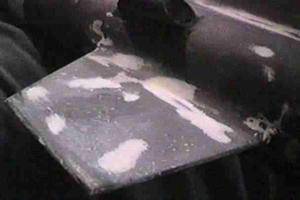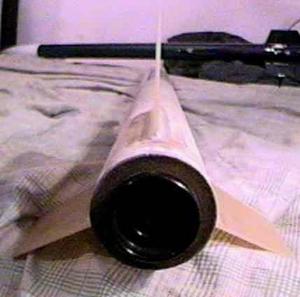Scratch Pushing the Envelope Original Design / Scratch Built
Scratch - Pushing the Envelope {Scratch}
Contributed by Brian Kain
| Manufacturer: | Scratch |
Download RockSim file here!
Brief:
My scratch built level 2 rocket. Made for the J-350 but can fly on small 29mm H
motors also. Used old phenolic but glassed with 6oz fiberglass and 30 min
epoxy. ACME 3/8" lugs, LOC nose cone, G-10 FR4 (fire and heat resistant
fiberglass). Radio shack personal body alarm for corn field recoveries. Custom
aluminum motor retainer bracket using all-thread for mounting. I used the
30" chute that came with my level 1 V.B. 54mm Extreme.
 Construction:
Construction:
Components: The sustainer uses 2 body tubes, joined with a phenolic coupler.
The 9/16" tubular nylon shock cord attaches through the coupler. I cut
slits in the coupler and weaved the shock cord through, looped it around onto
itself, and sewed it together with 100lb Kevlar® thread then epoxied over that.
I made an altimeter bay for future use, but was not planning on using
electronics for my cert 2. The rocket has 3 fins made from the heat resistant
G-10 FR4 fiberglass. I cut all my 1/8" and 3/16" centering rings and
bulkheads using a drill press and an adjustable hole cutter. The motor mount is
13" long by 38mm with 6 centering rings. The first 4 rings were epoxied to
the front of the MMT to keep it centered for TTW construction. I glassed
between each of the front centering rings with 6oz. Some of the epoxy I used
was aerospace grade 120 min setup. Great stuff, but big $$$. I used the
aerospace epoxy for external fillets and layed Kevlar® yarn into the epoxy
running lengthwise along the fin root. I only use stainless steel hardware for
attachment points since I have seen pot metal break. I used SS eye-loops and
3/16" SS quick links. I only added 1.5oz of lead fishing weight to the
nose, and secured with 120 min epoxy.

Construction: The rocket was fairly easy to build, but there are a couple hard parts. One concern was getting the epoxy to my TTW attachment points without getting it all over the back where the final centering rings go. I wrapped self releasing masking tape around the outside of the MMT. Then blue automotive masking tape around the inside of the airframe. This allowed me to just pour epoxy right onto the tape and have it flow down inside the airframe to my fin mounting points. Just remove the tape before it cures, then re-apply tape for the next set of fillets.
 A dremel tool with an extension is a
good item to have when cutting fins. Use a carbon cutting wheel and you can lay
the extension flat and so the dremel tool itself doesn't get in the way of the
line you are cutting. Without an extension, it is hard to get a flat straight
line because the tool gets in the way and will end up cutting crooked.
A dremel tool with an extension is a
good item to have when cutting fins. Use a carbon cutting wheel and you can lay
the extension flat and so the dremel tool itself doesn't get in the way of the
line you are cutting. Without an extension, it is hard to get a flat straight
line because the tool gets in the way and will end up cutting crooked.
I got my components at various launches over the period of 6 months.
Flight:
I made the rocket for the J-350, for my cert 2 flight. The rocket is very
straight forward, and basic to prep. I used cellulose insulation for wadding,
about 1 handful. Motor retention was a 1/16" piece of aluminum cut to fit
the back of the rocket. I drilled about 1" deep into the rear centering
rings in three points, then epoxied all-thread into the holes. The AT J-350 was
simple to prep. Don't mind the rattling of the grains, as long as you have no
left over parts they are supposed to move inside the case. I used 4oz of red
line chalk for tracking. 20' of 9/16" tubular nylon for the shock cord.
 The rocket
flew awesome. Dead straight in 15mph winds. That means it was perfectly stable,
not over stable. In the first 4 seconds of its 20 second flight, the rocket was
completely out of site, even though I have perfect vision, I could not see the
red line chalk when it deployed but someone with binoculars said they may have
seen a red chute or chalk. I have no idea if the recovery was late or early,
but drove with the wind at my back for about 2 miles before I found it. There
was no damage at all so it must have deployed around apogee. This rocket simmed
out at 9100' going about mach 1.1 In the video footage you can see the time of
each frame in the corner of the screen. The time read 12:46:00 pm for as long
as you can see the rocket in the picture. You can see snap shots of the video
here.
The rocket
flew awesome. Dead straight in 15mph winds. That means it was perfectly stable,
not over stable. In the first 4 seconds of its 20 second flight, the rocket was
completely out of site, even though I have perfect vision, I could not see the
red line chalk when it deployed but someone with binoculars said they may have
seen a red chute or chalk. I have no idea if the recovery was late or early,
but drove with the wind at my back for about 2 miles before I found it. There
was no damage at all so it must have deployed around apogee. This rocket simmed
out at 9100' going about mach 1.1 In the video footage you can see the time of
each frame in the corner of the screen. The time read 12:46:00 pm for as long
as you can see the rocket in the picture. You can see snap shots of the video
here.
Summary:
- This rocket is so strong I swear I can chop down a small tree with it.
- It is perfectly stable with a J-350 and only 1.5 oz of weight in the nose, yet it still has very small fins.
- I can still fly it on big G motors, all the way up to the J-570.
- Every time I have flown this rocket the flight was exactly the same each time. Recovery was about the same distance from pad. About 1.7 to 2 miles away.
Con's I can't really think of any. :)
Other:
One thing this rocket taught me is this........ It is hard to do
through-the-wall on a 54mm rocket with a 38mm motor mount. Especially when you
are using thick walled phenolic, there is even less room to work with.
Other Reviews
- Scratch Pushing the Envelope By Brian Kain
Pushing The Envelope 38 ( Contributed - by Brian Kain) Download RockSim file here ! Brief: A down scale of my level 2 rocket. TTW to a 29mm MMT. Can fly the I-200 load. If you were crazy you could cert 1 on this rocket with a 29mm H motor. 9400' on the H-90. Construction: 3 38mm body tubes Phenolic 3 1/16" G-10 fins 5 1/8" birch CR's 12" of 29mm ...
- Scratch Pushing the Envelope By Brian Kain
I wanted to build a rocket with the smallest fins I could get away with.....So I came up with this. I used Rocsim, VCP and WRASP to get my optimal size fin. Oddly enough, most of the programs agreed with my rocket. This is a single stage rocket, with an interchangeable MMT. Anything from 54mm down to 24mm motors will push this little guy. It uses a PML 30" chute with the shroud ...
 |
 |